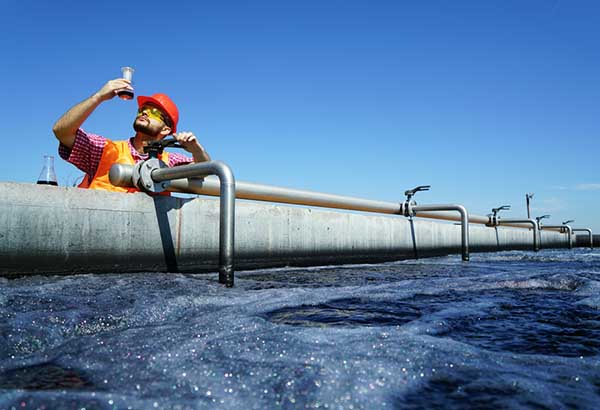
An Intensive 5-day Training Course
Oil Water Treatment Technology
Scheduled Dates
Classroom
| 15-19 Jun 2026 | Dubai - UAE | $5,950 | RESERVE A SEAT |
| 03-07 Aug 2026 | Abu Dhabi - UAE | $5,950 | RESERVE A SEAT |
| 30 Nov-04 Dec 2026 | Dubai - UAE | $5,950 | RESERVE A SEAT |
Online
| 22-26 Jun 2026 | Online | $3,950 | RESERVE A SEAT |
| 30 Nov-04 Dec 2026 | Online | $3,950 | RESERVE A SEAT |
Would an alternative date be more suitable?
We offer a variety of tailored training options, customized to meet your organisation's needs. Delivered anytime, anywhere, we make it easy to bring expert training directly to your team.
Why Choose this Training Course?
When oil companies drill a well, approximately 130,000 gallons of water are required. This quantity is dwarfed when during well stimulation, water usage increases to 2.5 million gallons. During production, water injection or flooding increases the well pressure and enhances oil recovery from 30% of the oil in place to as much as 50%. The water used during these operations is required to be of a certain quality, however the importance of proper water treatment is often underestimated. This is due to the tremendous variation in the water sources used i.e. seawater, borehole, and river water. Poor water quality may lead to clogging of the reservoir and loss of oil production particularly during well stimulation and water injection.
For every barrel of crude produced 7-10 barrels of water are produced, reusing it is vital for reducing the quantity of water used during the reservoir’s lifetime. Produced water contains some oil and its treatment to an environmentally acceptable level is mandatory before disposal. Good oil and water separation is therefore necessary and the physics as well as the mechanics of proper oil and water separation need to be well understood not only for water reuse but also to meet these strict environmental discharge regulations. The methods most commonly employed for oil water separations, include gravity settling and gas flotation. Flotation depends on the surface characteristics of the oil and on its interaction with the gas bubbles. The method used depends on many factors including the type and physical and chemical characteristics of the crude oil ultimately however the governing principle of these separations is dictated by Stokes law.
What are the Goals?
By the end of this PetroKnowledge training course, participants will be able to:
- Learn the details of the impact of effective oilfield water chemistry
- Comprehend how to assess the oilfield production liquid separation principles
- Understand the importance of proper water treatment
- Appreciate the importance of reusing produced water
- Develop skills necessary to evaluate the technologies used in oil and water separation
Who is this Training Course for?
- Engineering and Technical Personnel involved in water treatment
- Maintenance Coordinators
- Operations and Manufacturing Managers and Supervisors
- Foremen and Team Leaders
- Plant and Field Engineers
- New Engineers
- Those interested in obtaining a general understanding of water treatment technology
How will this Training Course be Presented?
A range of interactive training methods will be used including practical exercises, case studies, question and answer sessions and group discussions to cover current practices in the field. Presentations will underpin topics that highlight key issues on oil water separation technologies. The PetroKnowledge training manual will support the learning experiences and provide additional reference materials and examples.
Organisational Impact
- Recognized and respected certification for the delegates attending
- Assurance that the course is delivered by a quality training organization using a very experienced instructor
- Field engineers and staff with a deeper understanding and a better capability to critically analyze the methodologies employed within the industry
- Managers who have a broader overview and understanding of the structure and operations of the oil and gas production
- Employees who understand the details of the chemistry of oil and gas separation operations
- Delegates with the skills to make better decisions and contribute to performance evaluation and process troubleshooting
Personal Impact
- A better understanding of water chemistry
- A straightforward insight of oil chemistry
- A deeper understanding of the principles of the mechanics of oil and water separation.
- Troubleshooting operations that impact the industry
- Improved awareness of the existing and proposed new environmental regulations
- Identify & consider the many facets of this industry
Daily Agenda
Day One: Oilfield Water Chemistry
- The Nature, Chemistry and Composition of Hydrocarbons
- Water Chemistry Fundamentals
- Environmental Regulations and Water Specifications
- Environmental Impacts Caused by Produced Water
- Water Sampling and Analysis
- Test Methods for Oil and Grease in water
- Zero Liquid Discharge (ZLD)
Day Two: Oilfield Production Liquid Separation Principles
- Produced Water Generation and Production and Management Practices
- Wastewater recycle / reuse
- Water Scaling, Corrosion Control and Microbiology of Water
- Emulsions / Stabilization, Destabilization
- Simulation Software to predict water quality for injection
- Case Study Scaling Software demonstration
Day Three: Crude Oil Desalting
- Principles of flotation
- Dissolved/ Induced/ dispersed Air/ Gas Flotation
- Key Design Parameters of Flotation
- Air-To-Solids Ratio
- Henrys & Stokes Laws
- Nucleus & Rate of Rise Theory
Day Four: Separation and Treatment (I)
- Mechanical filters & Filtration Technologies
- Gravity Separation Systems
- Skim Tanks & Piles
- API Separators
- Plate Coalescers
- Evaporative processes
Day Five: Day 5: Separation and Treatment (II)
- Desalting Technologies
- Electro deionization
- Ion exchange
- Membrane processes
- Desalination
Certificate
- On successful completion of this Training Course / Online Training Course, a PetroKnowledge Certificate / E-Certificate will be awarded to the delegates.

